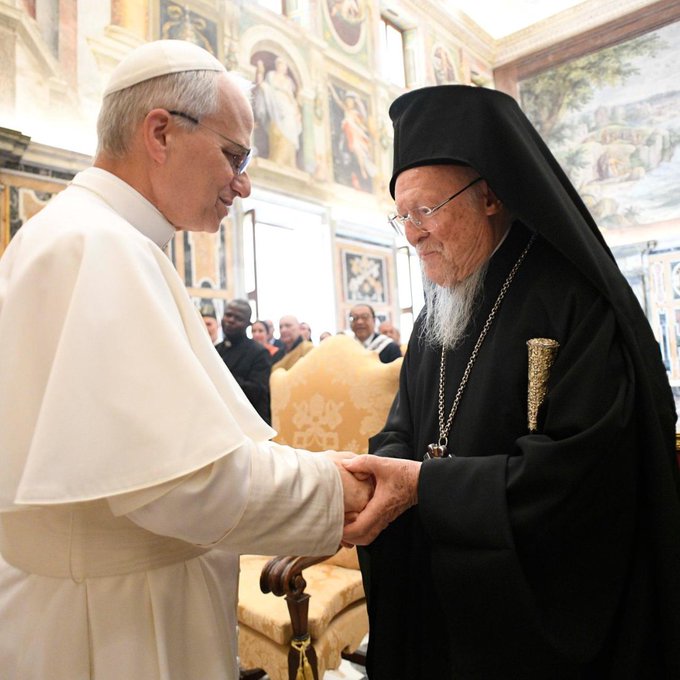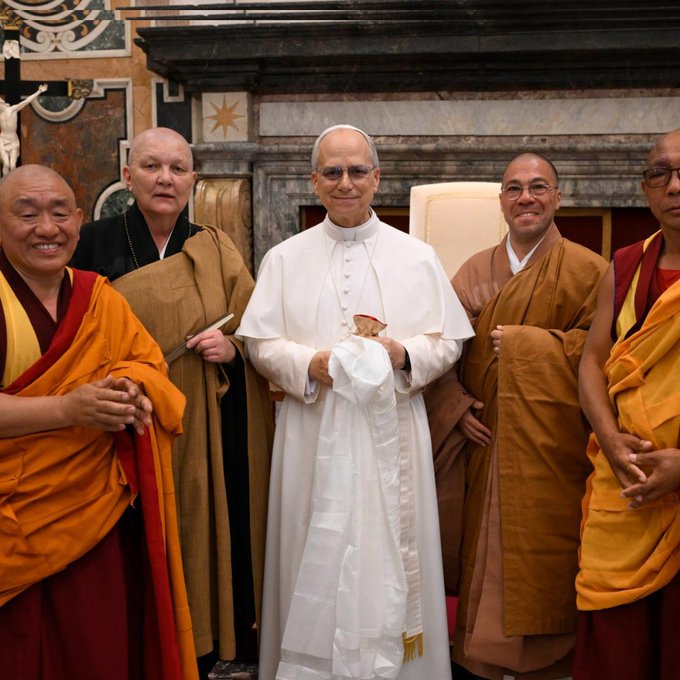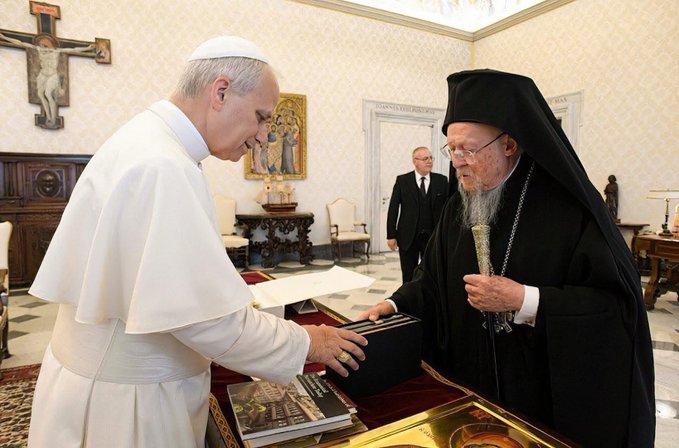Today is the 1700th anniversary of the beginning of the First Ecumenical Council of Nicea. It gave us the Nicene Creed, recited at (nearly) every Mass.
From Aleteia
By Kathleen N. Hattrup
May 20 is celebrated as the start of the Council of Nicaea, which gave us the Nicene Creed. Will the Pope and Patriarch be together in Turkey in November?"My election has taken place during the year of the 1,700th anniversary of the First Ecumenical Council of Nicaea. That Council represents a milestone in the formulation of the Creed shared by all Churches and Ecclesial Communities. While we are on the journey to re-establishing full communion among all Christians, we recognise that this unity can only be unity in faith. As Bishop of Rome, I consider one of my priorities to be that of seeking the re-establishment of full and visible communion among all those who profess the same faith in God the Father, the Son and the Holy Spirit."
Pope Leo XIV offered this reflection when he gathered Monday with representatives of other Churches and religions.
May 20
The exact dates of the Council of Nicaea are debated. However, May 20 is celebrated as the anniversary of the opening. We know it opened in the late spring and ended in the summer, in July of August, of the year 325.
Emperor Constantine was the one who called the Council.
Pope Sylvester I (pope from 314 to 335) was represented by delegates.
Celebrating the anniversary of this Council is momentous because it was held at a time when Christianity was united (that is, before the Great Schism of 1054 that divided the East (Orthodox) and West , and prior to the Protestant Reformation.)
In that same address, Pope Leo said:
Indeed, unity has always been a constant concern of mine, as witnessed by the motto I chose for my episcopal ministry: In Illo uno unum, an expression of Saint Augustine of Hippo that reminds us how we too, although we are many, “in the One — that is Christ — we are one” (Enarr. in Ps., 127, 3). What is more, our communion is realised to the extent that we meet in the Lord Jesus. The more faithful and obedient we are to him, the more united we are among ourselves. We Christians, then, are all called to pray and work together to reach this goal, step by step, which is and remains the work of the Holy Spirit
Turkey
Pope Francis had planned to go to Turkey to celebrate the anniversary with Orthodox Patriarch Bartholomew. A date for the trip was never announced, but it was expected to have taken place this week.
Pope Leo already assured, in his May 12 meeting with media, that he's intending to take up Francis' plans:
However, a date has still not been announced by the Holy See.
On Monday, May 19, the Patriarch and the Pope met privately.
Following that meeting Patriarch Bartholomew indicated that the trip could take place November 30. This date is significant because it is the feast of St. Andrew.
St. Andrew is the brother of St. Peter, and was first to follow Jesus.
Andrew was a disciple of John the Baptist, and responded to Jesus' invitation "come and see."
Then, St. John tells us:
One of the two who heard John speak, and followed him, was Andrew, Simon Peter’s brother. He first found his brother Simon, and said to him, “We have found the Messiah” (which means Christ). He brought him to Jesus. Jesus looked at him, and said, “So you are Simon the son of John? You shall be called Cephas” (which means Peter).
Andrew is thus referred to especially among the Orthodox as the First-Called. His missionary activity brought him east and he is recognized as the founder of the See of Byzantium-Constantinople. Bartholomew is thus considered his successor.
On the feast of St. Andrew each November and the feast of Sts. Peter and Paul in June, the Orthodox Church and the Catholic Church exchange official greetings and visits.
Celebration and hope
Thus, today as we celebrate the Creed that unites us and the Council where it was established, as we welcome a Successor of Peter devoted to unity and the brotherhood he shares with the Successor of Andrew, we look toward November and a visit to Turkey with hope and prayer.
Learn more about the Council, the Creed, and Nicaea here.
The International Theological Commission published “Jesus Christ, Son of God, Savior: 1700th Anniversary of the Ecumenical Council of Nicea (325-2025),” dedicated to the Council that produced the first universal creed and proclaimed the faith of salvation in Jesus Christ, and in the One God, Father, Son, and Holy Spirit.
Read more about that here.







No comments:
Post a Comment
Comments are subject to deletion if they are not germane. I have no problem with a bit of colourful language, but blasphemy or depraved profanity will not be allowed. Attacks on the Catholic Faith will not be tolerated. Comments will be deleted that are republican (Yanks! Note the lower case 'r'!), attacks on the legitimacy of Pope Leo XIV as the Vicar of Christ, the legitimacy of the House of Windsor or of the claims of the Elder Line of the House of France, or attacks on the legitimacy of any of the currently ruling Houses of Europe.